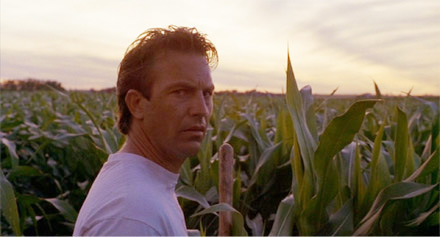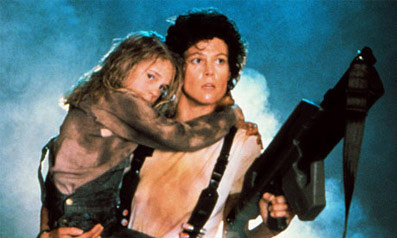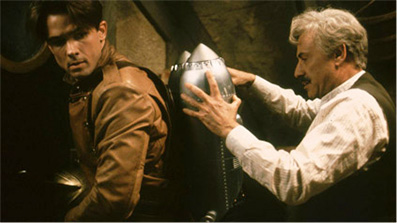| |
"To me, writing and composing are much more like painting, about colors and brushes; I don't use a computer when I write and I don't use a piano. I'm at a desk writing and it's very broad strokes and notes as colors on a palette. I think very abstractly when I'm writing. Then as the project moves on it becomes more like sculpting." |
| |
James Horner Interview, L.A. Times, December 2009 |
James Horner, whose light aircraft crashed in a forest near Santa Barbara on the 22nd June 2015, was a huge figure in Hollywood's musical landscape. In an effort to expunge the casual and lazy media practice of labeling him with his best-known successes (clue, doomed boat, smurfs in space), his other notable achievements are clouded with a dismissal unworthy of his status of a true giant in modern film scoring. Yes, there are cliques in movie music fandom, devotees of individual composers, prey to a tunnel-vision passion that by some bizarre norm encourages arch criticism of work not written by the composer of choice. I've been guilty of this all too often myself. Jerry Goldsmith, whom I was lucky enough to work with, told me that he would have killed to have scored Field Of Dreams... So I pronounced James Horner's own efforts as sub-Goldsmithian but in truth I adored every note. Horner's relatively simple melodies and ethereal synthesizers work so well in the context of that film that I still use cues from it today as temp tracks for films I work on. "Is this heaven?" "No, it's Iowa..." Lovely.

It's generally acknowledged that Horner got his big break in 1982 scoring Star Trek II: The Wrath of Kahn. Director Nicholas Meyer used to joke that he couldn't afford Jerry Goldsmith whose iconic main theme for the original 1979 Star Trek: The Motion Picture has rightly enjoyed a remarkably long shelf life. Horner grabbed the opportunity with both hands and turned in a brassy, bold orchestral powerhouse that all but ignored Goldsmith's superlative ST:TMP score (although there were traces of Alexander Courage's 60s TV main theme) and instead ploughed its own furrow. The film itself (generally regarded as the classic of Trek movies, sorry J.J.) gave his score the push into the big time. For my money, I always preferred Horner's scores that were less representative of his own house style. He had a run in the 80s when a Horner score was instantly recognizable (as were John Barry's works outside of his scores for a certain super spy). It wasn't so much the borrowing from classical and modern pieces but the wholesale raiding of his own work. But then, after every tenth movie came a score that seriously impressed for being resolutely atypical Horner. For every ten Apollo 13's sound-a-like scores, there was a Name of the Rose, a haunting and genuinely chilling work that moved Horner out of his comfort zone into some serious period and religious research. His score for 1992's Sneakers, (an underrated Robert Redford movie about digital activism) included a saxophone and choir based jazz slant which expanded Horner's boundaries. It was a simple theme accompanying a softly dramatic but hugely affecting overall score but it managed to capture the essence of the movie unifying its themes and disparate time frames. Horner did 'light' very deftly indeed.
Horner's collaboration with James Cameron has been well documented. His cue for Ripley and Newt's last stand on a disintegrating platform at the supposed climax of Aliens (on the album, it's known as 'Bishop's Countdown') suddenly started to turn up in all sorts of places. For years, it was the go-to-cue for a high action trailer but curiously it was used unashamedly at the climax of the original Die Hard (a movie that did not need or deserve such 'borrowing'). If you know the cue well, it drop kicks you out of McTiernan's superior thriller and while the 'wasn't he dead?' Karl suddenly throws off a blanket revealing a machine gun aiming at McClane, you're back with Ripley and Newt while Karl gets torso-holed by Al, the friendly, Twinkie-munching cop. It is bizarre when filmmakers do this (it's usually only score aficionados who notice these things and yes, we bore the hell out of anyone we may meet at the few parties we're invited to) and in many ways it's as annoying as hell. It was one of the reasons I just could not enjoy the otherwise mildly engaging The Artist. Huge chunks of Hermann's Vertigo suddenly sprung from the screen in their entirety, not even a subtle quote. There's a new movie proverb in there somewhere – leave Hitch well alone.

Horner soon became part of a game played by an old friend and myself. Horner was his composer of choice while I was in awe of Goldsmith's work. We could easily understand how many millions bowed down at the altar of John Williams but while his work was on many occasions brilliant we felt he'd been over-fêted for music that had been borrowed from elsewhere. Play Eric Korngold's Main Theme from King's Row and tell me it doesn't remind you of anything... So each new Horner went up against each new Goldsmith and of course, scores are never comparable even though we kept uh... scores. But we were passionate (I still am, my friend, sadly, was killed in 2009) and debates raged. All we had to go on was how the music made us feel, something two young men could not discuss with any ease. Emotions? Tchah. But it was also interesting taking a stand against something as mercurial and indefinable as music, something that a part of you buried deep inside was unaffected by reason or rational argument. It had ultimate power. You were either emotionally gut-punched or you weren't. One of the abiding arguments in the appreciation of movie scores is analogous to the old poetry canard. Is it written to be read or spoken aloud? Is film music written solely to service the visuals or can it exist 'au natural' and have an affect on its own in album form?
My own answer to that came in what appeared to be one of James Horner's typical scores. It boasts all of his orchestral trademarks. It's sickeningly American, upbeat, light, patriotic and squeaky clean. It's main theme is certainly hummable but the pace of the soundtrack album, the interspersed period songs and the all over feel of the whole was very comforting and, re-listening to it many times in its entirety, it just secured itself in my mind (especially on long car journeys). It was something that made time just slip away. Usually I'm all up for holding on to every second, carpe diem and all that but long car journeys can be the enemy of the 'now' and Horner's score made time skip like a flat stone in the surf. What is this mysterious balm of a CD? What movie could this spell of a soundtrack accompany? It's an anti-climax I can assure you (skip to the end, not too far now)*.
In hearing of James Horner's death, I realized two things. I will mourn his passing and note with sadness the tragic end of his contribution to modern cinema, boats and blue folk aside, and secondly, I miss my friend who championed him so passionately.

*The Rocketeer (I know but try it on long car journeys).
|